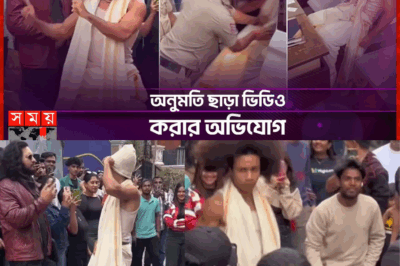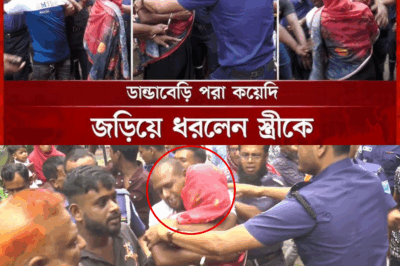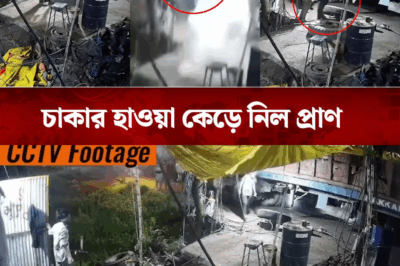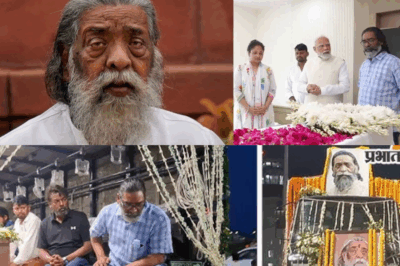The Final Goodbye to Shibu Soren: Jharkhand’s People Unite in Unprecedented Mourning
Ranchi, Jharkhand – The sun set over Morabadi on Monday, but the light at the residence of Shibu Soren, founding father of modern Jharkhand, burned brighter than ever—with candles, tears, garlands, and the undying reverence of those whose lives he transformed. The passing of the “Dasom Guru” at the age of 81 has left a void not only in the political fabric of Jharkhand, but in the hearts of millions across the nation. The outpouring of collective grief at his Morabadi residence transcended political, social, and cultural lines, revealing just how deeply this legendary leader was woven into the soul of his people.
A Night of Reverence at the Morabadi Residence
As night fell over Ranchi, crowds surged to Shibu Soren’s Morabadi residence. From the early evening, mourners of all kinds—from senior politicians to ordinary villagers—arrived to pay their respects. After a month-long battle with critical illness in New Delhi’s Sir Ganga Ram Hospital, Soren’s mortal remains were brought home, drawing his family, party cadre, and public followers into a sea of shared sorrow. His body, wrapped in the party’s signature flag and the Indian tricolour, symbolized the two great causes of his life: the Jharkhand movement and service to the nation.
Family members, led by Hemant Soren (Chief Minister and Sibu Soren’s son), Basant Soren, and Shibu Soren’s grandsons, performed the traditional act of carrying the body to the residence. The respect and responsibility shared among generations was palpable—showing not just a political legacy, but a lineage grounded in the ethos of struggle and hope.
An Unending Stream of Mourners
While politicians and dignitaries gathered, what was most striking was the number of common people—daily wage workers, activists, students, and the elderly—who arrived in droves for their own final goodbye. Party workers stood shoulder to shoulder with opposition leaders: Babulal Marandi, former Chief Minister; Raghubar Das, ex-CM; Congress stalwart Rahul Gandhi; and Ashu Party’s Sudesh Mahto, all came in person. Even bitter political foes laid aside differences to pay respect to the movement’s torchbearer.
Senior government officials and law enforcement established tight security and crowd management, but nothing could contain the emotion of the public swarming to glimpse their leader for the last time. The residence, described by many as “the birthplace of Jharkhand’s soul,” became a pilgrimage site overnight.
Political and Social Unity in Grief
Not just JMM and Congress, but BJP, regional outfits and social organizations joined together. Leaders from all walks of life—state ministers, members of parliament, former and current legislators, and influential community figures—queued alongside villagers who remembered standing shoulder-to-shoulder with Soren in protest marches decades earlier.
The tricolor and the party’s bow-arrow emblem covered Soren’s remains, and every visitor bowed in silent acknowledgement of the sacrifices that made Jharkhand a separate state in 2000—a cause Soren championed for nearly four decades, facing persecution, arrest, and political rivalry.
Messages from Across India
Tributes poured in from the highest offices: President Droupadi Murmu, Prime Minister Narendra Modi, Congress President Mallikarjun Kharge, and countless senior leaders tweeted or sent messages acknowledging Soren’s unique place in Indian politics. Their common message: Soren was more than just a chief minister or parliamentarian; he was a voice for the voiceless, a champion for tribal rights, and a rare unifying force.
Rahul Gandhi remarked:
“Shibu Soren’s life was a beacon of courage for the oppressed. His passion for justice will continue to light the path of countless Indians.”
The People’s Farewell
By midnight, the queue outside Soren’s house stretched for hundreds of meters. His residence was opened to all—ordinary people, his supporters, party workers—each wanting one last look, and the opportunity to offer a flower, a folded hand, or a silent prayer. Many wept quietly, while some sang songs that Soren himself used during movements and rallies. For countless tribal families, he was not just a politician but a personal hero—a liberator, an elder, and a spiritual guide.
The respect shown by party workers was also echoed by police and district administration, who ensured that the public could safely participate in this historical moment. The official arrangements—government banners, floral gates, the honor guard—merged seamlessly with the hearts and hands of regular citizens.
Historic Residence, Historical Farewell
Shibu Soren’s Morabadi home has always been more than just a house. The site witnessed countless secret meetings, planning sessions for agitations, and strategy debates during the Jharkhand movement. It was from here that Soren led hunger strikes, press conferences, and celebrations of every election victory. As one elderly supporter stated, “This house was the cradle of our revolution. Today, we say goodbye not just to a leader, but to the spirit of our own political childhood.”
Outside the house, posters and banners detailed Soren’s achievements: three-time Chief Minister, eight-term MP, the founding father of the Jharkhand Mukti Morcha, and most significantly—a man who endured exile and imprisonment for the cause of tribal dignity.
Last Rites in Nemra
While Monday night saw the rush of visitors in Ranchi, Tuesday morning will bring the final journey to Nemra—Soren’s ancestral village. There, his body will be laid to rest with full state honours. Already, villagers have begun preparations: floral arrangements, a ceremonial platform, and tribal music to accompany the procession. Local schoolchildren have rehearsed songs to sing in his memory.
The final rites will bring together not just politicians and family, but also people from every corner of Jharkhand. Police and administration expect one of the largest gatherings in Jharkhand’s recent memory, as people from remote villages and urban centers alike converge on Nemra for the last farewell.
The Depth of Soren’s Legacy
It is nearly impossible to capture Shibu Soren’s entire legacy in words. He did not merely fight for statehood; he nurtured a sense of identity for millions of Adivasis whose culture and voice had long been ignored by both Bihar’s rulers and the central administration. His vision led to land reforms, local governance structures, and the cultivation of a unique political consciousness among marginalized people.
His critics sometimes accused him of political pragmatism, but none could question his loyalty to his people. From raising the flag at tribal festivals to speaking in heated debates at Parliament, Soren’s presence was always unmistakable. He represented a bridge: between tradition and modernity, protest and governance, exclusion and inclusion.
A Shared Hope and Uncertain Future
With Soren’s death, Jharkhand stands at a crossroads. Many wept not only for his passing, but for the uncertain future—a question echoed in every hush and whispered conversation outside his house: Who will lead with such courage now? Can Jharkhand stay true to his vision of dignity, justice, and self-reliance?
Chief Minister Hemant Soren and family have called for calm and unity, reminding the public that the struggle for rights and recognition does not end here.
The Ongoing Homage
Even as the formal rituals wind down, the spirit of Soren’s last moments lingers. The queue outside Morabadi may fade, but the movement—both literal and metaphorical—he led will continue. By opening the doors of their home to the public, the Soren family has signalled that the legacy of Dasom Guru is not confined to a single surname or party, but belongs to all who still believe in the transformative power of hope and struggle.
In death as in life, Shibu Soren has again united Jharkhand’s people, transcending divides and giving a final lesson in solidarity and reverence.
News
Outrage in Gonda: Shocking Disrespect as Youth’s Body Dumped onto Road from Moving Ambulance
Outrage in Gonda: Shocking Disrespect as Youth’s Body Dumped onto Road from Moving Ambulance An incident so appalling and insensitive…
The Final Salute: Jharkhand’s Epic Farewell to Shibu Soren, The Father of A Movement
The Final Salute: Jharkhand’s Epic Farewell to Shibu Soren, The Father of A Movement As the monsoon clouds gathered over…
harkhand Mourns: The Last Journey of Shibu Soren, Architect of a State and Voice of Its People
harkhand Mourns: The Last Journey of Shibu Soren, Architect of a State and Voice of Its People By [Your Name]…
Thousands Pay Last Respects as Jharkhand Mourns the Loss of Legendary Leader Shibu Soren
Thousands Pay Last Respects as Jharkhand Mourns the Loss of Legendary Leader Shibu Soren A wave of mourning swept across…
Veteran Leader and Former Jharkhand Chief Minister Shibu Soren Passes Away at 81
Veteran Leader and Former Jharkhand Chief Minister Shibu Soren Passes Away at 81 New Delhi: In a tragic development, senior…
Munawar Faruqui’s Viral Reaction Sends Abhishek Kumar and Isha Malviya’s New Song into Frenzy: Fans Predict a Superhit!
Munawar Faruqui’s Viral Reaction Sends Abhishek Kumar and Isha Malviya’s New Song into Frenzy: Fans Predict a Superhit! Introduction What…
End of content
No more pages to load












